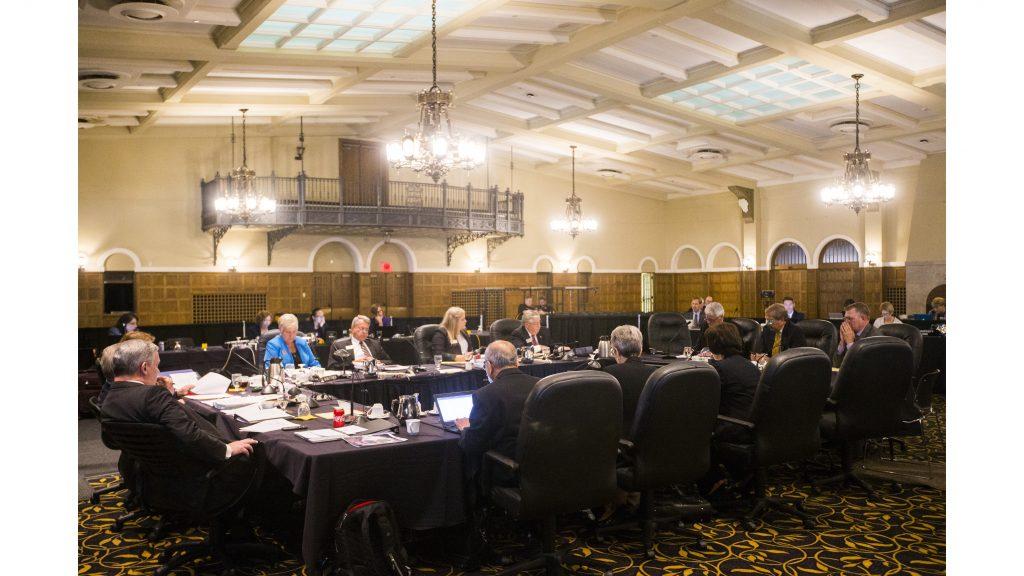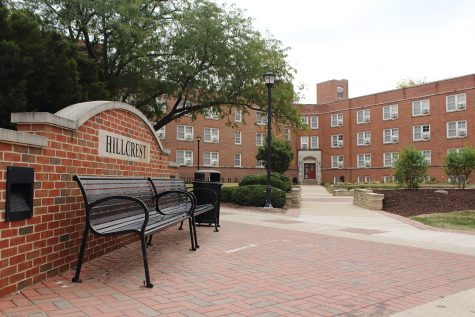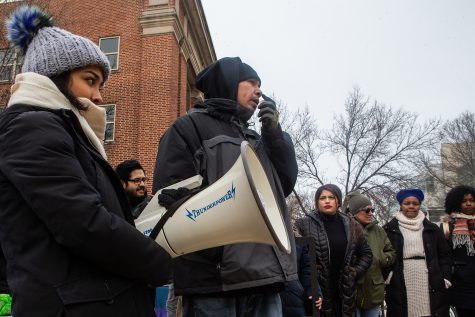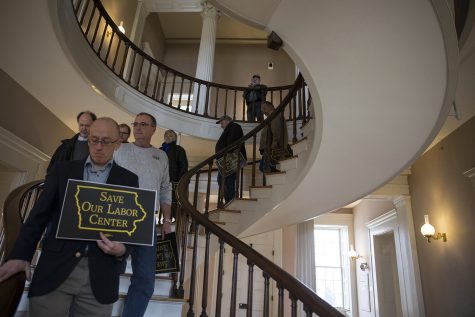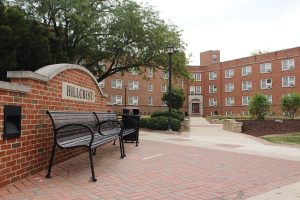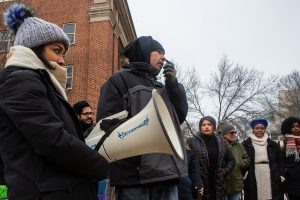Iowa university students ask regents to reconsider multiyear tuition model
During the public comment portion of the Feb. 28 Board of Regents’ meeting, members of Iowa Student Action expressed their concern about tuition increases proposed through the multiyear tuition model.
Regents listen to a presentation during a state Board of Regents meeting in the IMU main lounge on Thursday, Sept. 7, 2017.
February 28, 2019
AMES — Members of the organization Iowa Student Action called for the state Board of Regents to reconsider the multiyear tuition model the nine-member governing board discussed in November 2018 to make tuition hikes more predictable for students attending Iowa’s public universities.
Around 20 students from Iowa Student Action were in attendance at the regents’ meeting Feb. 28, representing Iowa State University, Des Moines Area Community College, Cornell College and Grinnell College. Five of the members — Chris Simmons, Kiran Lowenstein, Klarissa Gonzalez, Preston Burris, and Naomi Runder — spoke during the public comment portion of the meeting.
The regents oversee ISU, the University of Iowa, and the University of Northern Iowa, setting tuition rates only for students attending those three universities.
Iowa Student Action is a part of a project called People’s Action, an organization of college groups fighting for economical, racial, and gender justice.
RELATED: UI, ISU students likely to see 3 percent tuition hikes for five years, Iowa regents decide
The group fights for free college for all, and each speaker noted her or his own financial situation before telling the regents why tuition shouldn’t increase. The group membes believe that if tuition increases, it will make it more difficult for students with financial need to attend the regent universities.
“The reason I can’t afford to go to college is because at a school with the cheapest tuition in the state, my education is a profit for billionaires and corporations,”Des Moines Area Community College student Chris Simmons said. “That ain’t fair, that ain’t right.”
Students without the financial capability to pay for college are told they’re “worthless” because they don’t have the money for the university system to take away from them, Simmons said. If the university system can’t work for students with financial needs, then it “isn’t worthwhile,” he said.
Having access to higher education is a right for everyone through the job opportunities, societal benefits, and personal growth it provides, Grinnell College student Kiran Lowenstein said. The people in control of the education system aren’t fighting to make higher education accessible, she said, insisting that instead they’re using students as a form of profit.
“This is unfair to students,” Lowenstein said. “It is morally reprehensible to choke students and our families by raising tuition rates in order to enrich the wealthy. It is unfair to me and to every student attending college in the United States.”
As well as making education less accessible, raising tuition rates also make the regent universities seem unattractive compared with out-of-state universities that offer in-state tuition to Iowa students, Lowenstein said.
Compared with schools in their peer group, regent universities’ tuition rates are among the lowest, regents’ documents show. At the UI, however, UI President Bruce Harreld has advocated pushing tuition rates to the median of the UI’s 10-institution peer group.
Iowa Student Action is working to grow in numbers with the addition of members from the UI, but they were unable to attend the regents’ meeting, Grinnell student Naomi Runders said. The organization is working to build a statewide network, even if not all the students attend regent universities, she said.
RELATED: Iowa regents’ multiyear tuition model ‘better for students,’ UI president said
“I think what we’re hoping for with building a statewide network, even if it’s not entirely people from regents’ schools, is just maximizing our voices,” Runders said.
The inclusion of students all over the state of Iowa in the program is to emphasize that education inaccessiblity is not unique to regent universities, Runders said.
“If this board claims to be ensuring access to regent universities as its No. 1 priority, then why are you creating universities that only cater to the wealthy?” Simmons asked the regents.
The tuition increases mentioned in the multiyear tuition model are determined by state appropriations, reallocation of resources, and previous tuition rates, Regent President Michael Richards said.
“We’re projecting out [tuition rates] for families for five years,” Richards said. “We’re trying to be very moderate, we’re trying to be very honest in this world. We think we’re on the right path.”



